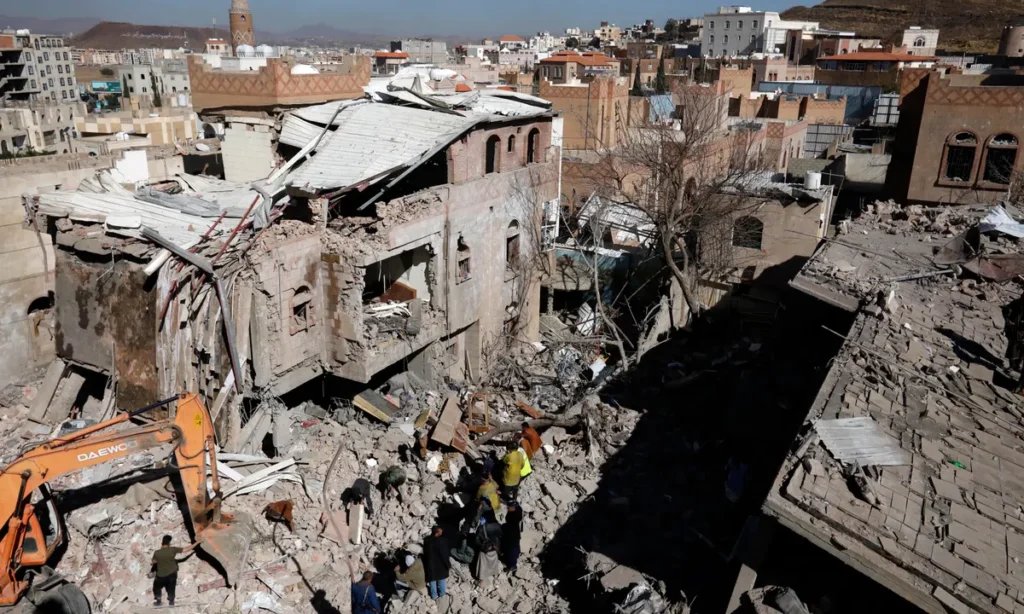The United States, in collaboration with the United Kingdom, recently initiated airstrikes against Houthi rebels in Yemen, heightening tensions in the oil-rich West Asian region. This military intervention unfolded in response to a series of Red Sea attacks by the Houthi rebels, disrupting commercial shipping and drawing global concern. The move raises echoes of the conflict between Israel and Hamas in Gaza, where the United States had previously expressed apprehensions about the potential spillover effects.
President Joe Biden underscored that the airstrikes in Yemen aimed to convey a strong message that the U.S. and its allies “will not tolerate” the Houthi group’s assaults on the Red Sea. The airstrikes, part of a broader coalition effort, were deemed necessary to protect global shipping routes and curtail the Houthi rebels’ military capabilities.
In parallel, UK Prime Minister Rishi Sunak offered a statement supporting the airstrikes as “necessary and proportionate.” He emphasized the airstrikes were a defensive response to repeated Houthi attacks in the Red Sea. The international community had issued warnings to the Houthi rebels, urging restraint, yet the attacks persisted, prompting the coordinated military action.
The impact of these airstrikes resonated in the oil markets, with prices surging in response. The targeting of Houthi rebels is intricately connected to their disruption of commercial shipping, a vital concern for global oil transportation. Notably, the attacks in the Red Sea prompted Maersk, a major shipping company, to halt its operations. The U.S. and UK airstrikes were positioned as a strategic response to safeguard maritime routes and address the threat to global energy security.
This recent military engagement is part of a broader geopolitical landscape marked by complex conflicts and power struggles. The Houthi rebels, aligned with Iran, have been at the center of Yemen’s protracted civil war. Their actions have not only impacted the domestic dynamics of Yemen but have also triggered international responses.
In a separate development, Iran’s navy captured an oil tanker in the Gulf of Oman. The vessel, formerly known as the Suez Rajan, had faced a previous dispute in 2021 when the U.S. seized its cargo of Iranian oil over sanctions related to Tehran’s nuclear program. This incident adds another layer of complexity to the regional tensions, involving Iran and the enforcement of sanctions.
The Houthi rebels, while framing their attacks as a response to Israel’s actions in Gaza, have increasingly targeted ships with broader global implications. This underscores the interconnectedness of conflicts in the Middle East and the potential ripple effects on international trade and energy markets.
Oil prices, as a barometer of these geopolitical tensions, have experienced fluctuations. While the conflicts in the Middle East have provided support to crude oil prices, concerns about rising non-OPEC (Organization of the Petroleum Exporting Countries) supply, Saudi Arabia’s deep pricing cuts, and growing U.S. stockpiles have contributed to volatility in the oil market.
The broader implications of these developments extend beyond regional conflicts. They touch upon the delicate balance of global energy markets, the security of critical maritime routes, and the intricate web of geopolitical alliances. The airstrikes against Houthi rebels in Yemen represent a strategic response to safeguard international interests and stability.
It’s essential to recognize that the designation of groups like the Houthi rebels as “terrorist organizations” is often subjective and influenced by geopolitical considerations. The complexities of the conflicts in the Middle East involve a mix of historical, religious, and political factors, making it challenging to categorize actors definitively.
The recent airstrikes by the U.S. and the UK against Houthi rebels in Yemen mark a significant development in the evolving geopolitical landscape of the Middle East. The multifaceted nature of conflicts in the region, coupled with their global implications, necessitates a nuanced understanding of the motivations behind military interventions and their repercussions on international relations, energy security, and the stability of crucial maritime routes.
